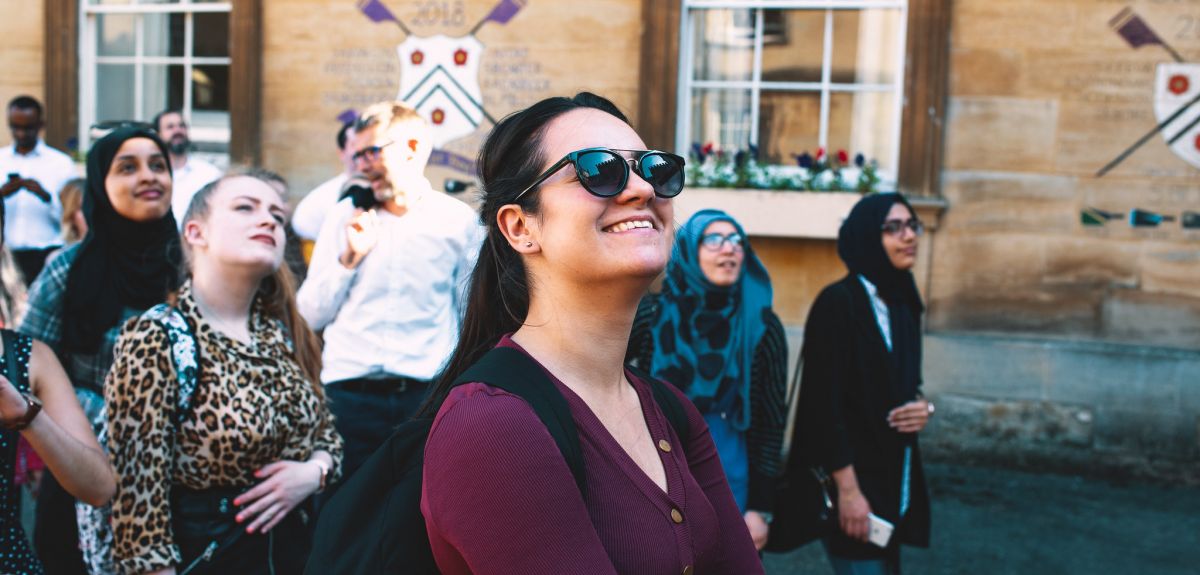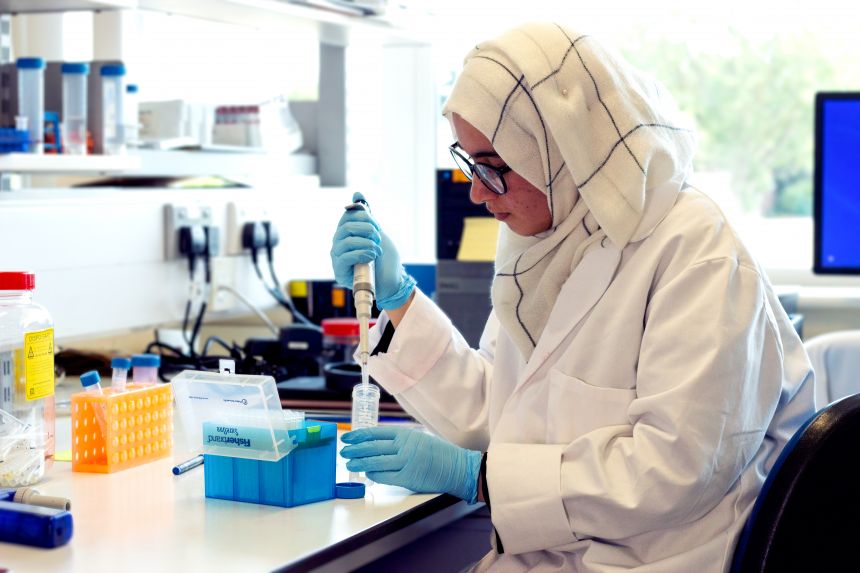
Oxford's first postgraduate access programme draws to a close
Oxford University’s first ever graduate access summer school finishes this week after a successful pilot year.
UNIQ+ summer school launched at the beginning of July with 33 students from 23 different universities around the country arriving for the immersive six-week-long DPhil (PhD) experience.
The programme gives potential applicants from areas and groups that traditionally have low-progression into postgraduate study the chance to experience what it is like to be a research student at Oxford, with a focus on the medical, biological, mathematical and physical sciences.
Almost 200 applications were received for the first year of UNIQ+, which builds on the success of the recently expanded UNIQ residential summer school for A-Level students from under-represented backgrounds.
 Image credit: Phil Brooks, OU
Image credit: Phil Brooks, OUUNIQ+ participant Jawaria, working on multiple myeloma at the Botnar Research Centre.
Over the six week duration, the programme has included research training and events with guidance and mentorship from Oxford’s academic staff and current DPhil (PhD) students. A combination of practical workshops and talks offer support with applying for postgraduate study, career guidance, interview skills, and information about funding opportunities for DPhil (PhD) study, to help them decide whether a career in academia is right for them.
Participants also received a £2,500 stipend to offset any loss of potential earnings during this time, and free accommodation in one of 14 participating colleges.
Alongside UNIQ+, Nuffield College is hosting a social sciences summer school for six undergraduates, the Nuffield Undergraduate Scholars Institute (NUSI). NUSI provides training in social science methods and the opportunity to gain research experience.
Through a programme of activities and events, both academic and social, participants of both initiatives gain a behind the scenes look at life as a postgraduate researcher, and leave with a flavor of Oxford student life in general.
Haniah, a UNIQ+ participant studying paediatrics, said: ‘The support and encouragement given to us by UNIQ+ staff to pursue higher education, not just at Oxford but anywhere in the world has been wonderful, and the options for our future are limitless.’
Jawaria, working on multiple myeloma at the Botnar Research Centre, said: ‘The most interesting part for me is getting to work in an Oxford laboratory. My supervisor is so nice and has so much experience, and this gives me the opportunity to think on my own and come up with ideas we can use in our research. UNIQ+ has provided me with an opportunity to experience Oxford in the laboratories as well as in colleges, and has given me the confidence to apply for graduate study, because if you have the results and passion for what you want to do, why shouldn’t you apply?’
Tommy, working at the Nuffield Department of Population Health, said: ‘My UNIQ+ research project is ticking off all the buzzwords – it involves deep learning, the gut-brain, probiotics – it’s amazing to be involved in answering tomorrow’s questions. UNIQ+ has given me the opportunity to experience life as a DPhil student and ask how it fits into my future ambitions – it has a lot to offer in helping me apply to universities in the future.’
David Gavaghan, Professor of Computational Biology and Director of the MPLS Graduate School, said: ‘The first students to experience UNIQ+ have arrived at Oxford giving those from under-represented backgrounds the chance to experience the University’s world-leading research environment. Students are supported by an academic supervisor during their time here, finding out more about life as part of our research community, and demonstrating that there is no typical Oxford experience or student. They are also supported by a DPhil student mentor and accommodated in one of our colleges. We hope that many of these students will consider our doctoral research programmes and go on to make successful applications for postgraduate study.’
The Warden of New College, Miles Young, commented: ‘On 3 July, we welcomed the first cohort of UNIQ+ and NUSI students for dinner at the start of their first experience of Oxford. Access and widening participation is often seen as an undergraduate issue. But we believe it is just as much a graduate one. The same barrier exists: the false perception that ‘Oxford is not for me’. We hope to dispel that, but also to give some very tangible insights and skills which will help any graduate to apply or to get the most out of a programme.’
The inaugural year of UNIQ+ is supported by the EPSRC- and MRC-funded Sustainable Approaches to Biomedical Science (SABS) Centre for Doctoral Training, the BBSRC Interdisciplinary Bioscience Doctoral Training Partnership, the Mathematical Institute within the Mathematics, Physical, and Life Sciences (MPLS) Division, and a number of departments within the University’s Medical Sciences Division.
Though the 2019 programme is limited to subjects in medical, biological, mathematical and physical sciences, planning is underway to expand UNIQ+ in 2020.
 New study finds that ChatGPT amplifies global inequalities
New study finds that ChatGPT amplifies global inequalities
 Expert Comment: Chatbot-driven sexual abuse? The Grok case is just the tip of the iceberg
Expert Comment: Chatbot-driven sexual abuse? The Grok case is just the tip of the iceberg